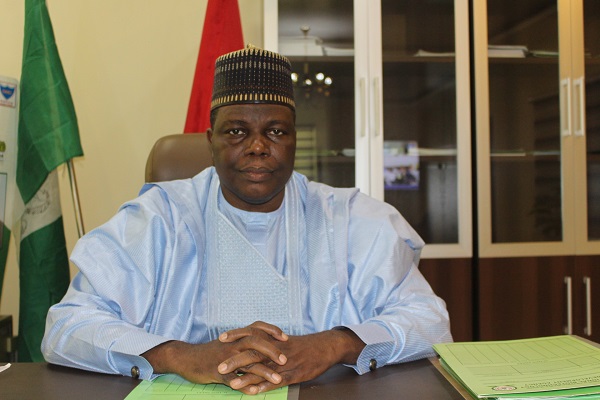
By Sylvester Thompson
Prof. Abdullahi Mustapha, Director General of National Biotechnology Development Agency(NABDA), said investors should invest and benefit from biotechnology as the market was growing at exponential rate.
The D-G said this on Monday which was NABDA’s day at the just concluded seventh edition of 2023 Science, Technology and Innovation (STI) Expo in Abuja.
In his presentation on: “Actualizing Effective Diversification of the Nigerian Economy through the Science of Modern Biotechnology Practice’’, Prof. Mustapha made illustrations based on a global index report.
Based on a December 2021 market research report by Polaris market research report, he illustrated via the Polaris market analysis, the expected growth of global biotechnology market size.
He showed that in 2020, the market grew from $753.48 billion to an estimated $1,000.46 billion in 2021.
“This steady rise will continue on the foreseeable future, with projections for it to reach $3,879.51 billion by 2030 with a compound annual growth rate of 13.9 per cent,’’ he explained.
“Each year the market keeps increasing and this is the current data as 2022 was not yet calculated.
“This is the difference between 2020 and 2021, which means that there is huge opportunity in biotechnology market.
“This is an opportunity which investors have to take as an opportunity because when things started in the preliminary, people never knew that it would be a boom in the near future, that biotechnology market would record tremendous growth,’’ he said.
He noted that these markets were all in North America, Europe, Asia Pacific, Latin America, the Middle East and Africa.
He said the graphic illustration depicted that the Middle East and Africa were at the top which represented thinness, meaning that Africa was yet to enter the field of modern biotechnology.
“We have not even started compared in percentage to those countries that have invested in biotechnology,’’ he said.
He pointed out in the graphic illustration, top 25 companies of the world based on their stock market value, that were listed as reaping benefits of their investments in biotechnology.
“But when you look at these top 25 companies, regrettably, no company comes from Africa, talkless of Nigeria.
“There are huge opportunities in biotechnology and Nigerian investors should start thinking of investing in this technology as beneficiary countries are all from Japan, China and Asian Tigers and none from Africa’’, Mustapha said.
He further said that biotechnology had applications in four major industrial areas of health care (medical), crop production and agriculture, industrial, environmental uses and other products notably biodegradable plastics, vegetable oil, biofuels.
Looking at economic diversification, he defined it as the process of shifting an economy away from a single income source towards multiple sources from a growing range of sectors and markets.
He said diversification of the economy was necessary, that refusing to diversify was like putting all the eggs in one basket which had a higher risk of total loss, and that the idea of many baskets was safer though costlier.
According to him, diversifying entails bringing in more resources into the country from different sectors and he went ahead to list various sectors of the economy which could contribute to make the Nigeria economy stronger.
He emphasized that science and engineering based innovation was what was necessary, what was being embraced and working out in the present civilised world.
“Without science and engineering, nothing will be moving forward, we would be going back to the dark ages.
“Nigeria must invest in science and engineering in order to move forward to diversifying,’’ the D-G said.
Accordingly, he clarified that science and engineering led to entrepreneurship where new technology companies would emerge, leading to growth, export and wealth creations.
He said that with the growth of the economy, what was expected was that such growth should contribute to the funding of STI, meaning that knowledge from universities, research institutions and independent scientists would be funded to do more.
“This is what is obtainable around the world and Nigeria needs to embrace this.’’
He said the world was tilting towards a knowledge-based economy, adding that numerous people have consistently emphasized the economic potential of knowledge-based business sectors and the need to invest as well as the infrastructures needed.
“The bio-based economy is one of the key sectors in this category, able to profit from the accelerating rate of new discoveries and technical developments.’’
He said Nigeria was a bio-based economy which was one of the key sectors of STI, meaning that biotechnology was part of the knowledge that propelled economic growth through bio- economy.
Giving further clarifications, Prof. Mustapha said that it was projected that by 2050, the world population would hit 9.7 billion with nearly 2 billion more than the number currently recorded on the planet.
He argued that the projected population of people would depend on the ability of biotechnological innovation to create viable ways to produce the food to grow, the materials to use, and the fuel that would help in transportation.
“ Biotechnology gives us solutions derived from nature that drive food and farm innovation, bio-based manufacturing, and the utilization of cleaner energy.
“Biotechnology is the tool for economic development, it’s the tool because with biotechnology many things can be brought out and produced which is hard to imagine,’’ he stated.
On how NABDA was actualizing economic diversification strategy through modern biotechnology, the NABDA boss mentioned various areas the agency was impacting national growth.
He said that in agriculture, NABDA was engaged in crop improvement, animal and fish improvement through research and other development activities.
In medicine, it was in the area of drug discovery, vaccine development among others while the environmental aspect consisted of clean energy, blue economy, and clean environment among others.
He said in industry it was development of enzymes among others as well as numerous contributions of the agency to national development.